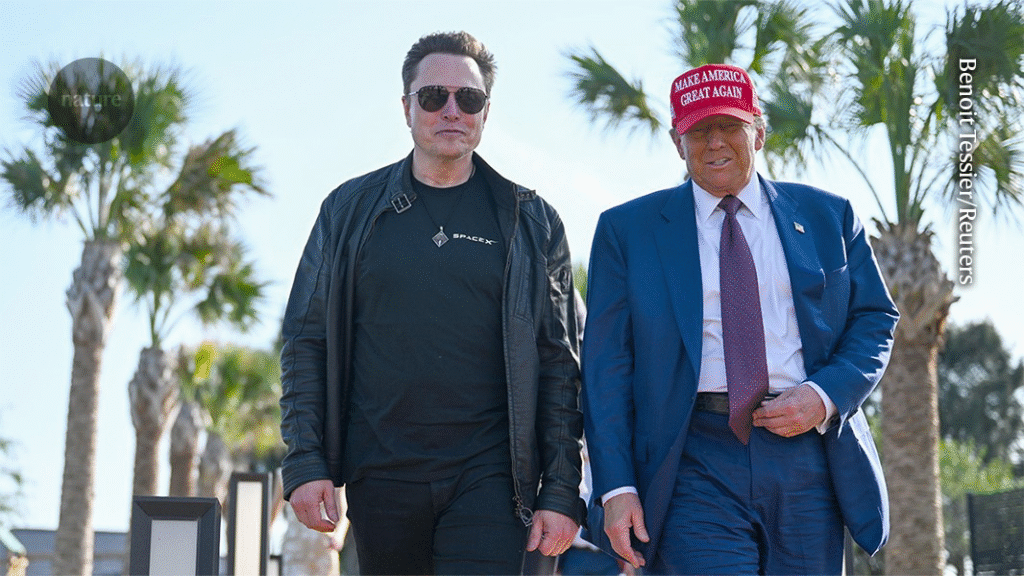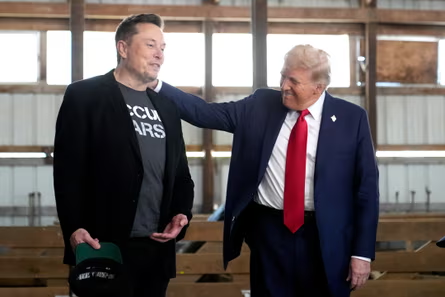
In the corridors of power and Silicon Valley’s buzzing streets, few relationships have garnered as much attention as that of Elon Musk and Donald Trump. Their association, characterized by initial camaraderie, strategic partnerships, and eventual estrangement, offers a fascinating glimpse into the complex interplay of politics, business, and personal ideologies. This rollercoaster relationship, marked by mutual respect, controversies, and public spats, remains a compelling narrative in the world of global leadership and innovation.
The Genesis of an Unlikely Friendship
Elon Musk, the maverick entrepreneur behind Tesla and SpaceX, and Donald Trump, the billionaire real estate magnate turned U.S. President, began their public association with a surprising note of mutual admiration. Trump, during his presidency, often lauded Musk as an exemplary innovator. Musk, in turn, showed a willingness to collaborate with the administration, particularly on issues concerning renewable energy, manufacturing, and infrastructure development.
Their relationship took shape during Trump’s early days in office. Musk was invited to join several advisory councils, including the President’s Strategic and Policy Forum. These roles positioned Musk as a critical voice in discussions about the nation’s economic and technological future. For Musk, it was an opportunity to influence policies directly impacting his businesses. For Trump, Musk’s involvement added a sheen of modernity and progressiveness to his administration.
Musk’s initial willingness to engage with Trump drew praise and criticism alike. Some viewed it as a pragmatic approach to achieving his ambitious goals, while others questioned the wisdom of aligning with an administration often at odds with Musk’s values. The optics of the relationship were particularly intriguing, as it symbolized a bridging of worlds—one rooted in traditional business and politics, and the other in disruptive innovation and futuristic vision.
A Pragmatic Collaboration
The initial phase of their association was marked by pragmatism. Musk saw Trump’s presidency as an opportunity to advance his ambitious plans for renewable energy and space exploration. This included lobbying for tax incentives for electric vehicles, championing solar power initiatives, and advocating for government contracts to support SpaceX’s ventures.
Trump’s administration, in turn, recognized Musk’s companies as emblematic of American ingenuity. Tesla’s rise as a global leader in electric vehicles and SpaceX’s groundbreaking work in reusable rocket technology aligned with Trump’s agenda to “make America great again” through economic and technological dominance.
However, this partnership was not without its challenges. Musk’s commitment to addressing climate change often clashed with Trump’s policies, particularly his decision to withdraw the United States from the Paris Climate Agreement. Musk’s response was swift and decisive—he publicly announced his departure from Trump’s advisory councils, stating that the decision to exit the Paris Agreement was “not good for America or the world.”
This moment marked a turning point in their relationship. Musk’s stance resonated with his employees, customers, and a broader global audience concerned about environmental issues. It also established Musk as a principled leader unafraid to speak out against policies he believed were detrimental to the planet’s future. Yet, it underscored the inherent tension in Musk’s relationship with Trump, rooted in their fundamentally divergent views on climate and sustainability.
Divergence and Public Spats
As the Trump administration progressed, ideological differences between Musk and Trump became increasingly apparent. Musk’s forward-looking vision, rooted in sustainability and technological innovation, stood in stark contrast to Trump’s often conservative and nationalistic policies.
Musk’s outspoken criticism of Trump’s stances on climate change, immigration, and social justice further strained their relationship. In turn, Trump’s supporters often criticized Musk, accusing him of being out of touch with the average American. Despite these tensions, Musk maintained a pragmatic approach, continuing to seek opportunities to advance his business interests within the framework of Trump’s policies.
Trump, known for his unpredictable and often confrontational style, did not shy away from criticizing Musk either. He downplayed Musk’s achievements, even suggesting that Tesla and SpaceX owed their success to government subsidies. Musk, however, responded with characteristic poise, emphasizing the transformative impact of his ventures and their alignment with America’s broader goals of innovation and progress.
The divergence extended beyond policy disagreements to public spats on social media and during interviews. Musk’s measured yet firm critiques contrasted sharply with Trump’s often fiery rhetoric. For example, Musk’s emphasis on science-driven solutions to problems like the COVID-19 pandemic stood at odds with Trump’s handling of the crisis, further exacerbating their differences.
Fallout and the End of a Bromance
The final phase of Musk and Trump’s relationship was marked by an unmistakable fallout. As Trump’s presidency faced mounting controversies, including the Capitol riots and allegations of undermining democratic norms, Musk’s distancing became more pronounced.
Musk’s tweets and public statements increasingly reflected his disapproval of Trump’s actions and rhetoric. While he refrained from outright denunciation, his subtle jabs and pointed critiques spoke volumes. For Musk, aligning too closely with Trump risked alienating a significant portion of Tesla’s customer base, particularly younger, environmentally conscious consumers.
Trump, on the other hand, seemed to lose interest in maintaining a cordial relationship with Musk. His focus shifted to consolidating his political base and addressing challenges to his leadership. The once-promising alliance between two of the world’s most influential figures had effectively disintegrated.
The Capitol riots in January 2021 marked a watershed moment. Musk, while not directly addressing Trump, made cryptic remarks about the importance of democratic institutions and the rule of law. These comments were widely interpreted as a critique of Trump’s role in the events. The fallout from the riots solidified Musk’s position as a figure willing to take a stand for principles over politics.
Reflections on a Complicated Legacy
The relationship between Elon Musk and Donald Trump serves as a microcosm of the broader dynamics between business leaders and political figures. It underscores the challenges of balancing personal ideologies with strategic interests and highlights the impact of public perception on high-stakes partnerships.
For Musk, his association with Trump was a double-edged sword. While it provided a platform to influence national policies and advance his ambitious goals, it also exposed him to criticism and scrutiny. For Trump, Musk’s involvement lent credibility to his administration’s claims of fostering innovation and economic growth, even as their ideological differences became a source of contention.
The legacy of their relationship is a nuanced one. It highlights the potential for collaboration between diverse worldviews but also underscores the limits of such alliances when core values are at odds. Musk’s insistence on prioritizing sustainability and innovation serves as a stark contrast to Trump’s often transactional approach to relationships.
Lessons for the Future
The Musk-Trump saga offers valuable lessons for leaders navigating the complex intersection of politics and business. It underscores the importance of clear communication, mutual respect, and the ability to adapt to evolving circumstances. Most importantly, it highlights the need for leaders to remain true to their core values while pursuing strategic alliances.
As the world continues to grapple with pressing challenges such as climate change, technological disruption, and geopolitical tensions, the relationship between visionaries like Musk and policymakers will remain critical. Their ability to collaborate, despite differences, could hold the key to addressing some of humanity’s most urgent issues.
Looking forward, the story of Musk and Trump serves as a reminder of the intricate and often unpredictable dynamics of leadership. It is a tale of ambition, conflict, and the enduring quest for progress in a world where the lines between politics and business are increasingly blurred. As both figures continue to shape their respective domains, their complex relationship will remain a topic of intrigue and reflection for years to come.

